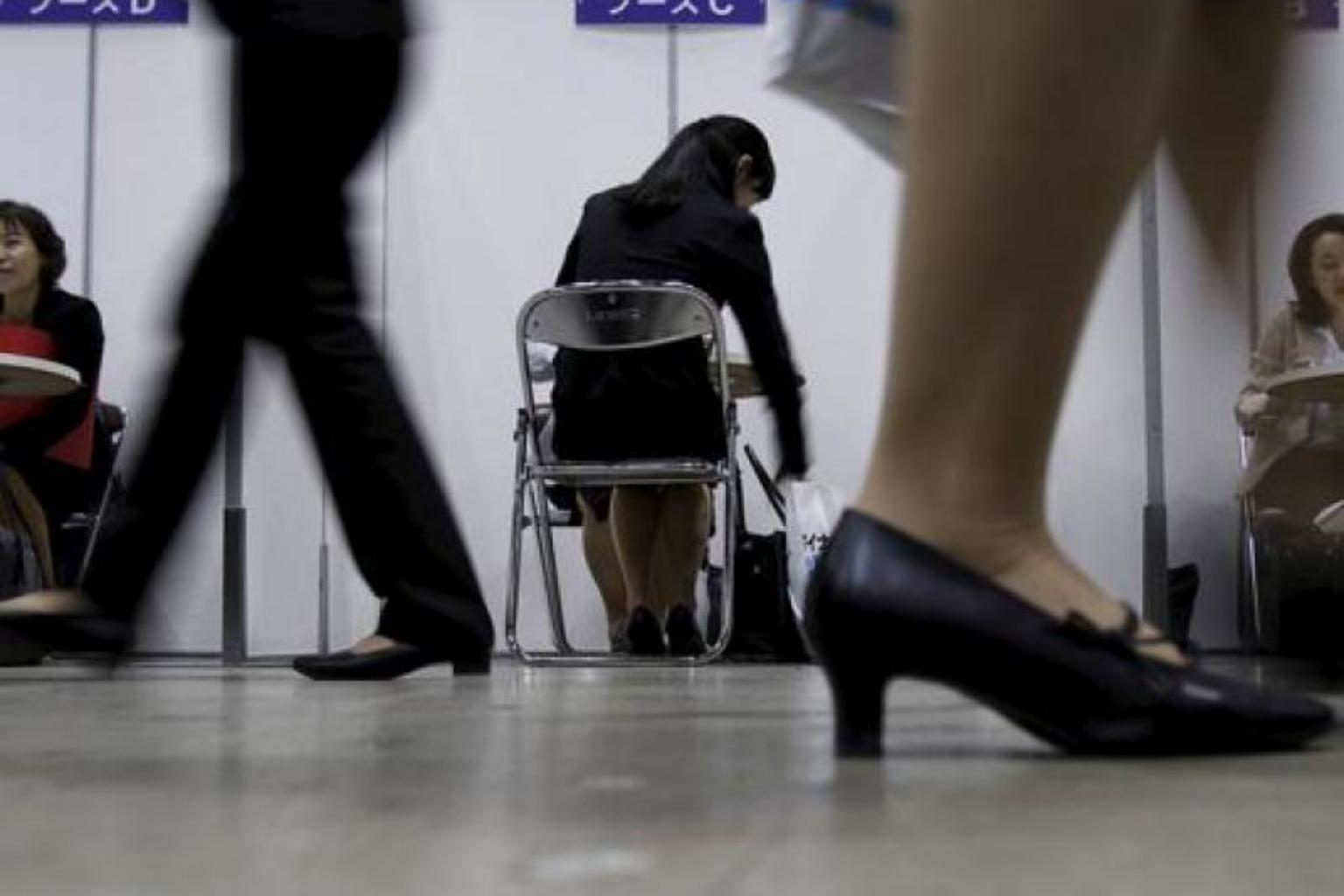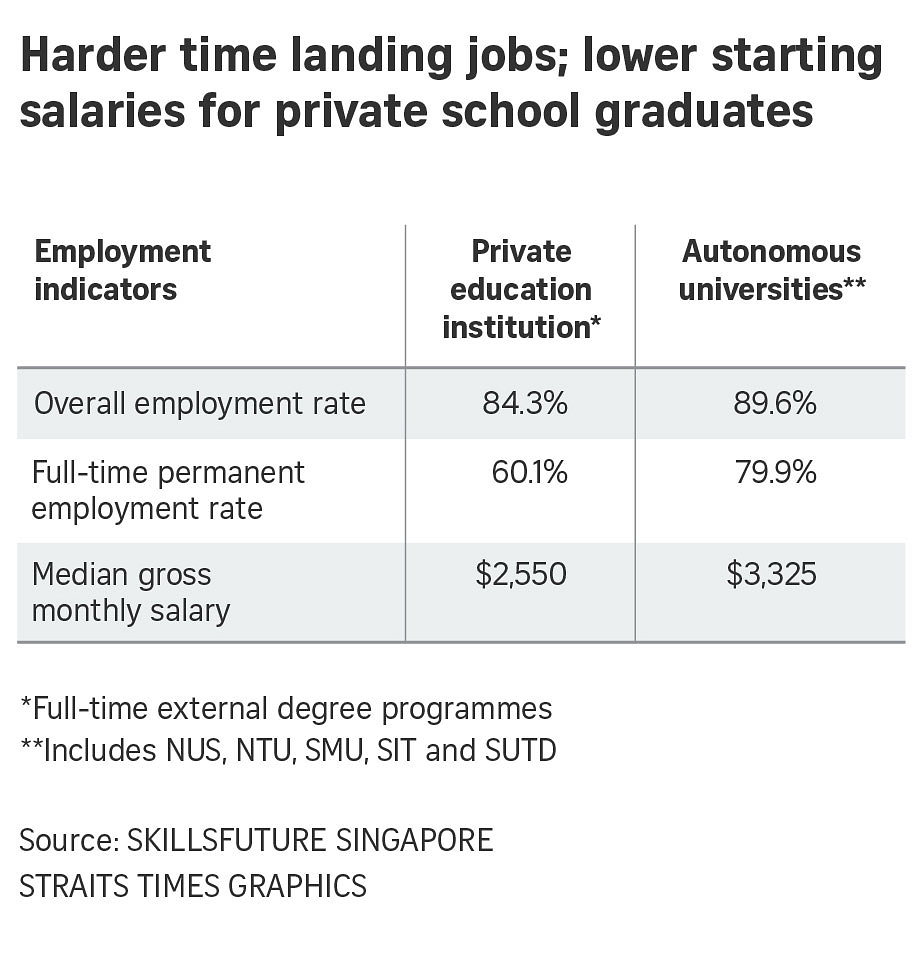Only 6 in 10 private school graduates found full-time work 6 months after graduation: Survey
Sign up now: Get tips on how to help your child succeed

Six in 10, or 60.1 per cent of private school students found full-time permanent work within six months of completing their studies.
PHOTO: REUTERS
SINGAPORE - Private schools graduates lag far behind their peers from public universities in the job market, an inaugural employment survey released on Wednesday (Nov 15) has found.
Many not only had a tougher time landing full-time jobs compared to public university graduates, but they also received lower starting salaries.
The survey by the Committee for Private Education (CPE), which regulates the private education industry, offers the first comprehensive picture of how Singaporeans who get their degrees from private education institutions fare in the job market. Similar surveys have been done for other institutes of higher learning, such as the autonomous universities, polytechnics and the Institute of Technical Education.
The latest results showed that just six in 10 (60.1 per cent) of private school students found full-time permanent work within six months of completing their studies. Their median starting pay, which is the midpoint salary in a range, was $2,550 a month.
This compares with the 79.9 per cent full-time job rate of graduates from the autonomous universities - the National University of Singapore (NUS), Nanyang Technological University, Singapore Management University, Singapore University of Technology and Design and Singapore Institute of Technology. The median starting pay for those from these autonomous universities was $3,325 a month.
The broad-based survey, which was conducted from July to September this year, gives a glimpse of the job prospects of private school graduates and also helps prospective students choose between various institutions. It comes after a pilot survey last year revealed similar findings.
The latest survey focused on students who graduated from full-time external degree programmes between May 2015 and April 2016, and had no prior full-time permanent jobs. Of the 11,003 such graduates, 32 per cent responded. Graduate employment surveys for autonomous universities and polytechnics usually see a response rate of about 70 per cent.

They were asked about their employment status six months after finishing their final examinations, including the nature of their jobs and starting salaries.
It is mandatory for all private education institutions offering external degree programmes to take part in the survey. Some 40 private schools were surveyed in the exercise, of which 29 had graduates from full-time external degree programmes.
The survey showed that in all, 84.3 per cent of private school graduates found work - including full-time, part-time, contract or freelance ones - within six months of finishing their examinations. This compares with the 89.6 per cent overall employment rate of graduates from the autonomous universities.
Last year's pilot survey also found that private school graduates had a harder time finding jobs compared with their peers from public universities, and received less pay. It showed that only 58 per cent found full-time work within six months of finishing their studies. Their median starting pay of those with full-time jobs was $2,700 a month.
The pilot, however, surveyed only 4,200 students who graduated with degrees from nine private schools in 2014.
SkillsFuture Singapore (SSG) chief executive Ng Cher Pong shared that the latest results are not surprising, as the findings are similar to those in the pilot. The CPE is parked under the SSG statutory board.
"We intend to use these survey results to help prospective students to make decisions, particularly those who are at important junctures in their lives where they are thinking hard about whether they should study further, start working or pursue a work-learn pathway," Mr Ng said.
"This set of results will help them make choices. They know the sort of employment outcomes they can achieve and they can weigh that against the cost of pursuing external degree programmes."
Observers said graduate employment surveys help students to make more informed decisions when choosing between schools.
While highlighting that the latest findings may be skewed because schools of different quality are lumped together, they shared that the dismal showing gives the private education scene a sobering reality check. Some established players, such as the Singapore Institute of Management, conduct their own graduate employment surveys yearly.
NUS economics lecturer Kelvin Seah said: "Currently, students might be choosing private schools without having a reliable knowledge of their job market prospects after graduation. As such, many of them might be making decisions with an over-optimistic attitude of what to expect when they graduate."
Jalan Besar GRC MP Denise Phua, who heads the Government Parliamentary Committee for Education, added that Singaporeans should "not be too quick to conclude...that private university graduates are not as good as the public university graduates", noting that she has worked with some who are "excellent performers".
"It is important to conduct a deeper-dive analysis of employer perceptions even before hiring decisions are made, and how graduate applicants are commonly evaluated during screening of applications and at interviews," she said.
"It would also be useful to include in the surveys, employer feedback on the performance levels of both groups of graduates after a period of employment."
Established private education players said the survey findings were not an accurate reflection of the scene, adding that private schools have varying standards and should not be lumped together.
Kaplan Singapore president Leon Choong said private education institutions "have a myriad of differences in their programme offerings, conditions in which a school operates and delivers on its programmes, the standing of their university partners and, to a large extent, the...student profiles and their success stories".
Schools said the survey results may be skewed, as it garnered only a 32 per cent response rate from those polled. The rate from similar surveys for autonomous universities and polytechnics is usually about 70 per cent.
Dr R. Theyvendran, secretary-general of the Management Development Institute of Singapore, said employability statistics for different private schools and public universities would differ as methodologies and response rates differ.
"The sample size is definitely not a good representation of the whole private education landscape," he added. "Therefore, it would not be fair to put all schools in one basket."
Observers said a perception still exists among employers that degree programmes of the public universities are more rigorous. There is also a stigma that those attending private schools may be weaker in academics.
Mr Paul Heng, managing director of NeXT Career Consulting Group, said hiring managers may think that "private schools are a secondary choice for students and, thus, less attractive".
Despite the less than stellar survey findings, experts believe that it is up to students to prove themselves in the job market.
Ms Linda Teo, country manager at ManpowerGroup Singapore, added that alumni have a role to play in paving the way for their juniors. "They have to demonstrate through their work performance that private schools' graduates are as capable, if not more so, than graduates from public universities."


